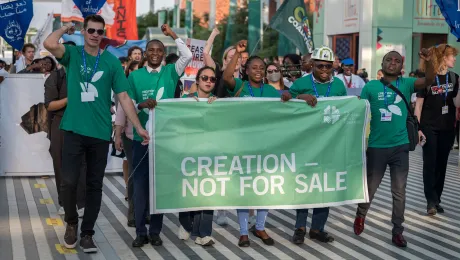
In this montage are Lutheran leaders, from left to right: Bishop Dr Jack Urame (Papua New Guinea), Bishop Medardo E. Gómez Soto (El Salvador), LWF Vice-President Bishop Kristina Kühnbaum-Schmidt (Germany), and Bishop Dr Fredrick Onael Shoo (Tanzania). Photo: LWF
Encouragement to LWF COP 29 delegation to insist on action that guarantees a sustainable future
(LWI) – As The Lutheran World Federation (LWF) delegation and other faith-based organizations at COP 29 engage with stakeholders for effective climate action, Lutheran leaders are adding their voices for an outcome that guarantees a sustainable future for the most vulnerable people and all of God’s creation.
In his message, Bishop Medardo E. Gómez Soto of the Salvadoran Lutheran Church emphasized the critical need for climate action that addresses the irreversible impacts on the most vulnerable in Latin America and the Caribbean (LAC). “We are stewards of creation, and the fulfillment of our mission includes responsibility to meet the challenges posed by climate change, which threatens biodiversity and life itself.”
Gómez highlighted the region’s struggle with climate emergencies, including habitat loss and damage to lands, urging joint efforts to reforest, protect ecosystems, and conserve aquifers. He called on countries to fulfill their commitments and prayed for fruitful outcomes, stressing the LWF LAC region’s strategy of advocating locally for effective climate justice policies over the next three years.
For the hardest hit, it is about survival
The LWF delegation at this year’s United Nations climate conference comprises young people from member churches around the globe, church leaders, representatives of the LWF Climate Justice taskforce, and staff from World Service country programs. COP29 convenes 11-22 November, under the theme “In Solidarity for a Green World,” focusing on critical negotiations in three areas: effective climate financing, commitment to reduce carbon emissions aligned to the 1.5 degrees target, and addressing loss and damage that includes non-economic impacts.
Bishop Kristina Kühnbaum-Schmidt, LWF Vice-President for Central Western Europe, and head of the Evangelical Lutheran Church in Northern Germany, highlighted the importance of mobilizing climate finance to mitigate and adapt to climate impacts, particularly in the most vulnerable countries. “The most vulnerable populations, such as women living in poverty, youth, and people with disabilities, are hardest hit by climate change and have limited resources to recover,” she noted. Supporting the LWF delegation at COP29, Kühnbaum-Schmidt affirmed, “Creation is not for sale!” and called on the largest emitters to lead by example, committing to actions aligned with the 1.5°C target. She praised the dedication of young leaders and reaffirmed the church’s role in advocating for global justice.
In the spirit of Reformation, we must create a peaceful and just world, ensuring human dignity and the care of God’s creation
Bishop Dr Jack Urame, Evangelical Lutheran Church of Papua New Guinea.
Bishop Fredrick Onael Shoo, Northern Diocese of the Evangelical Lutheran Church in Tanzania, underscored the dire impacts of climate change on livelihoods. “As a church leader in Africa, I have witnessed how frequent droughts and floods devastate communities, leaving millions hungry.” He highlighted the rapidly diminishing glaciers of Mount Kilimanjaro that have resulted in the drying up of many rivers and streams that serve as water sources for people, animals and plants in the area and beyond.
Shoo, who is known for his tree planting campaigns for nearly two decades now, urged global leaders at COP 29 to act decisively, emphasizing, “Time is running out—it’s about our survival as the citizens of planet Earth.” He insisted on commitments “to cut off CO2 emissions immediately” and for the global community to assume the moral responsibility of assisting those already suffering from climate impacts. “We have talked a lot, but now we need to take concrete action for the sake of our communities and our future generations.”
Prophetic voice for justice
Bishop Dr Jack Urame, Evangelical Lutheran Church of Papua New Guinea (ELCN-PNG), referred to his 2024 Reformation Day message, in which he urged the local and global church to reflect on the relevance of Luther’s spirit of Reformation in confronting climate injustice and societal inequities “in a broken world today torn apart by sin, human greed and violence.”
Urame emphasized that “the church’s prophetic voice must amplify the message of grace and justice,” and challenge systems that exploit creation and marginalize humanity. He condemned exploitative capitalist models and ecological degradation, particularly in Papua New Guinea, where deforestation from uncontrolled logging, sea water pollution and marine life destruction from extractive mining, and rising sea levels threaten lives and livelihoods.
Churches, the ELCN-PNG bishop stressed, have a moral duty to actively advocate for environmental justice, and hold governments accountable for reducing carbon emissions, promoting renewable energy, and protecting ecosystems and communities from environmental harm. As stewards of creation, churches must be engaged in the political space to inspire ethical governance and transformation. “In the spirit of Reformation, we must create a peaceful and just world, ensuring human dignity and the care of God’s creation,” he added.
The LWF delegation to COP29 comprises church leaders—men, women and youth—from all continents, advocating for the most vulnerable people from a faith perspective. They join efforts with ecumenical and interfaith partners in online and face-to-face meetings.



